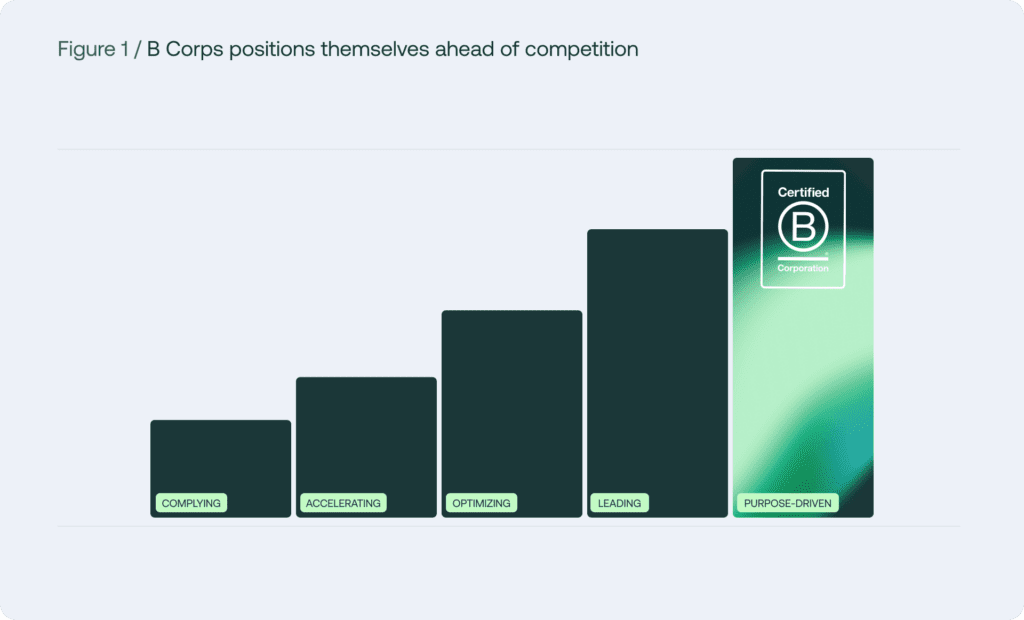 Understanding Scope 1 and 2 greenhouse gas emissions
Understanding Scope 1 and 2 greenhouse gas emissions
To B or Not to B, is the question for sustainability managers and organisations looking for ways to showcase their commitment to sustainable practices.
Amidst a landscape of increased environmental consciousness and regulatory pressures, businesses are now more than ever under pressure to improve their sustainability practices and communicate them.
Simultaneously, the rise of Environmental, Social, and Governance (ESG) criteria in investment decisions underscores a growing trend, wherein capital is increasingly channelled towards businesses with a strong commitment to sustainability.
With increased scrutiny often comes increased complexity. The array of stakeholder expectations, regulatory pressures and duplicity of disclosures has led to significant burden and confusion in the sustainability landscape.
While we have offered some insights to help you understand the sustainability landscape in our previous article, this piece will specifically focus on the B Corp Certification: what is it about and why you should consider it for your organisation.
If you want to dive deeper in the topic and learn more about the certification process, we have shared insights in this article.
What is the B Corp certification?
“B Corporation” is the designation for the certification demonstrating a business’ high standards of verified performance, accountability, and transparency. B-certified corporations ensure:
- A high social and environmental performance.
- A legal commitment to changing the company’s corporate governance structure to be accountable to all stakeholders.
- Transparent disclosure of the company’s performance measured against B Lab’s standards.
B Lab, launched in 2006, is the non-profit organisation behind the B Corp certification, ensuring that the assessment is up-to-date and rigorous. This assessment-based certification measures companies to a high standard of social and environmental performance, making it unique in the landscape of global certifications.
Beyond ethical considerations, obtaining B Corporation status proves a strategic move with tangible commercial gains. B Corps, exemplified by industry leaders like Patagonia and Etsy, capitalise on this trend, enjoying a market advantage.
What are the benefits of becoming a B Corp?
Competitive advantage
Embracing sustainability as a growth strategy
In an era of “greenwashing” and misleading labels, Certified B Corporations serve as reliable markers for discerning consumers.
Rigorous certification processes and standardised impact assessments ensure elevated scrutiny, fostering accountability and transparency. With nearly 8,000 B Corps globally, spanning 130 industries and 50 countries, the movement’s impact is substantial.
CEOs highlight networking and strategic partnerships as key benefits, emphasizing the collaborative strength within the B corporate tribe. Finally, in the wide spectrum of sustainability today, B Corps position themselves at a high maturity level, thus setting them apart from the rest of the market.

Capital attraction
ESG investing in the spotlight
The global surge in sustainable investing has resulted in the allocation of trillions of dollars based on Environmental, Social, and Governance (ESG) criteria.
B Corporations, inherently aligned with these values, have become increasingly attractive to a growing number of investors. The 2020 Global Sustainable Investment Review noted that sustainable investments accounted for over $30 trillion in assets, reflecting a 68% increase over four years.
By obtaining B Corporation status, businesses strategically position themselves as desirable investment opportunities, gaining access to a capital pool that prioritises financial returns and positive societal impact.
The “B” designation is a magnet for capital, with investors showing explicit favouritism towards socially responsible businesses. The market for socially responsible investing, estimated between $400 billion and $1 trillion according to JP Morgan, is experiencing significant growth, with the Millennial Generation playing a pivotal role in driving this expansion.
As companies align their values with those of the Millennial Generation, the fastest-growing demographic group, to attract and retain talent, the value of the “B Corps” designation is expected to increase even further with the growing purchasing power of this influential generation.
Increased resilience and reduced regulatory risk
Staying ahead of challenges
One notable advantage of B Corp certification lies in the resilience it provides to a company’s corporate structure during periods of economic instability.
According to B Lab, Certified B Corporations exhibited a remarkable 63% higher likelihood of surviving the 2008 recession compared to companies without the B designation.
Since then, these certified entities have consistently demonstrated an annual survival rate ranging from 90% to 99%, in contrast to the 69% average among small businesses in the United States.
Moreover, Certified B Corporations exhibit enduring performance in the long term. The heightened regulatory scrutiny faced by businesses poses an increased risk of non-compliance with evolving sustainability standards.
By voluntarily undergoing a rigorous certification process, B Corporations showcase their commitment to meeting high social and environmental performance standards. This proactive stance aids in mitigating regulatory risks by ensuring that a company’s practices align with current and future regulations.
By directly confronting these challenges, B Corps become industry leaders in corporate responsibility, staying ahead of regulatory shifts and minimising potential negative impacts deriving from an evolving regulatory landscape.
Improved credibility and brand recognition
Walking the talk
In a marketplace where consumers demand authenticity, B Corporation certification serves as a powerful symbol of commitment to sustainability.
B Corps are held to rigorous standards, and the certification process is a thorough evaluation of a company’s impact on workers, customers, community, and the environment. This authenticity enhances brand reputation, fostering trust among consumers who are increasingly sceptical of greenwashing.
According to a Nielsen study, 66% of global consumers are willing to pay more for sustainable brands. By becoming a B Corporation, businesses not only talk the talk but walk the walk, building a credible and recognised brand that resonates with conscious consumers.
Talent retention
Top-tier employees increasingly seek purpose-driven work environments, and B Corporations, by design, champion a triple-bottom-line approach, prioritising not only profits but also social and environmental impacts.
This commitment to a broader mission fosters a profound sense of purpose among employees, resulting in elevated job satisfaction and increased retention rates.
A Cone Communications survey reveals that 64% of millennials consider a company’s social and environmental commitments when choosing where to work, underscoring the significance of a robust sustainability ethos in attracting and retaining top talent.
Engaged employees, who are 3.5 times more likely to invest personal time in innovation and problem-solving, contribute to a more dedicated and skilled workforce.
Recognising the value of employee engagement, B Lab includes it as a metric on its Impact Assessment, alongside other crucial factors like salary, wellness initiatives, diversity, and benefits. While this transparency invites scrutiny, it also incentivises strong performance in these areas.
Certified B Corporations and Benefit Corporations not only foster employee engagement but also attract top talent, a critical consideration as Millennials, comprising 75% of the workforce by 2025, increasingly prioritise a company’s purpose and mission when choosing employers.
Educational institutions like the Yale School of Management, NYU Stern School of Business, and Columbia Business School further endorse this trend by offering loan forgiveness programmes for graduates employed by Certified B Corporations, reinforcing the growing importance of mission-driven companies in the talent market.
The strategic imperative of the B Corporation certification
Beyond representing a moral imperative, becoming a B Corp stands as a strategic decision harmonizing with evolving regulations, appealing to investors, retaining top-tier talent, mitigating regulatory risks, and bolstering brand credibility.
In a contemporary business landscape where sustainability transcends mere buzzwords to become an imperative, B Corporation certification emerges as a guiding force, leading companies toward a future characterized by responsibility and resilience.
However, acknowledging the substantial resources and commitment required, the decision to become a B Corp demands thoughtful consideration. For those seeking guidance in this transformative journey, B Way consultants such as Nexio Projects stand ready to provide tailored assistance, offering a roadmap to help companies navigate the path toward becoming purpose-driven corporations.
To learn more about how to become a B Corp, get in touch on LinkedIn or via this form. We would be happy to help you if you need support with your certification.











